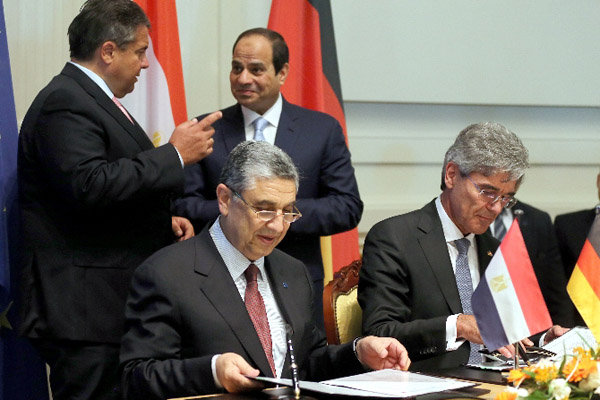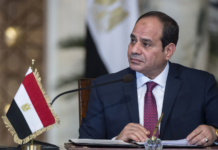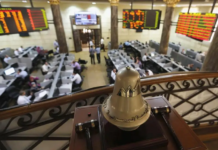
by Maye Kabil
El-Sisi signs deals for energy, railways and a free trade agreement
Working to overcome its economic downturn, Egypt is repairing its international relations, paying efforts to attract investors and export a different perception on the ruling regime.
Right after a European tour, in which President Abdel Fattah El-Sisi visited Germany and Hungary, Egypt is witnessing the creation of Africa’s largest free trade area between the continent’s three major economic blocks, COMESA, EAC and SADC.
The summit which ends its sessions today in Sharm El Sheikh brings together the 26 countries which are members of the three blocks, and gives Egypt free trade access to seven new African nations.
President Sisi is attending the summit, among thirteen heads of African states and other African delegates, to sign a deal to create free trade zones for goods immediately, with the hope of introducing services and intra-continent investor opportunities at a later stage.
The three groups of countries, which accounts for 51 per cent of Africa’s $2.3 trillion GDP, include South Africa, Rwanda, Zambia, Ethiopia, Eritrea, Kenya, Egypt and Zimbabwe.
Egypt expects to see its exports to African countries rise by 100 percent in three years to $5 billion compared to $2.7 billion in 2013, a growth rate of 33 percent annually.
Sharm treaty is the culmination of four years of negotiations among member states of the tripartite, which ended in a tentative consensual agreement reached in Burundi in October 2014.
Earlier this month the president ended a visit to Europe, in which he signed economic agreements and invited investors to come to Egypt.
The visit started in Germany’s capital Berlin on 3 June, in which he had talks with German President Joachim Gauck, and German Chancellor Angela Merkel.
The main economic achievement of this visit was an 8 billion euro (S$12 billion) power deal with the German industrial company Siemens. (read more).
The company signed with Egypt a deal to supply gas and wind power plants to boost the country’s electricity generation by 50 per cent. This deal is Siemens’ single biggest order and gives a much-needed boost to its gas and power division which is struggling at home.
This was a result of earlier commitments made during the international economic conference that Sisi called for in March, when Egypt signed several memorandums of understanding in that conference held in Sharm El Sheikh to improve its creaking national grid.
Egypt is going through its worst energy crisis in decades, with power cuts common as its ageing state-run infrastructure struggles to handle rapidly growing demand for electricity in a country of 87 million people.
The president next station was at Budapest where he met the Hungarian Prime Minister Viktor Orbán. Both leaders signed a joint declaration and two other cooperation pacts. They also signed a letter of intent for Egypt’s order of 700 Hungarian railway carriages, to help restoring that suffering sector.
In 2013, the Egyptian Railway Authority agreed with the government of Hungary to develop, with the participation of Egyptian companies, Hungarian-manufactured trains to be in service in Egypt by 2020.
The Ministry of Transportation asked the Hungarian side to manufacture train parts within Egypt depending on the availability of local components in the Railway Authority’s workshops and infrastructure in Abu Za’abal.
The Hungarian Express train was one of the most significant projects between the two countries.
Egypt and Hungary already cooperate in the fields of vehicle production and construction materials, including ceramics, textiles, cosmetics and electric cables. The trade balance is in favour of the Hungarian side, with Nokia mobile phones constituting the highest percentage of Egyptian imports from Hungary, while fruits and vegetables constitute one third of the Egyptian exports, according to figures from the State Information Service.
Addressing a business forum organised by the Hungarian National Trading House later in the day, Orban said Hungary was interested to see Egypt succeed.
President Sisi told the forum that after four years of instability Egypt has embarked on the path of growth. He asked Hungarian companies and investors to contribute to the process.
Many steps are being taken on the external level, other important internal steps are to be taken to pave the way for a desired economic growth.











